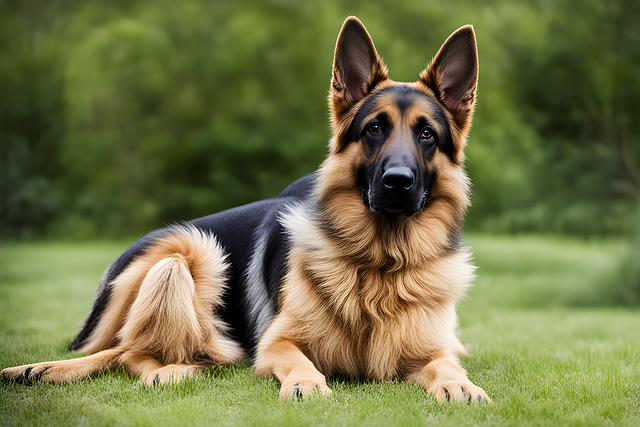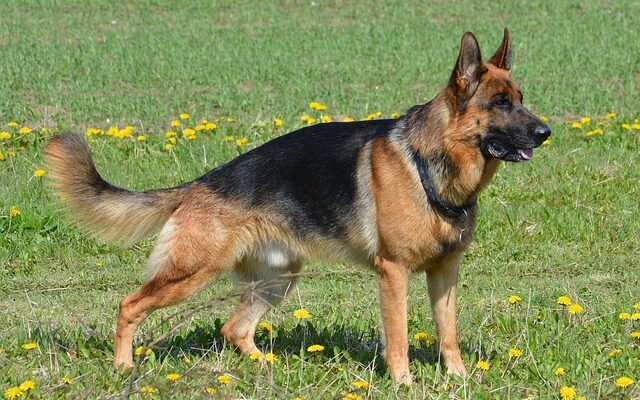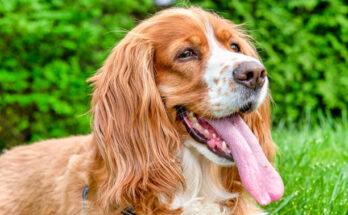The German Shepherd holds the second position among the brilliant dog breeds while earning first place for dedication through its versatile ability to undertake multiple tasks. These dogs provide excellent service capabilities together with being the ideal pet for families and work environments. This definitive manual explains full canine welfare by presenting training strategies followed by exercise protocols and nutrition advice and longevity methods for German Shepherds.
Table of Contents
- Introduction to the German Shepherd
- History and Origin
- Physical Characteristics
- Personality and Temperament
- Training a German Shepherd
- Exercise and Activity Requirements
- Nutritional Needs and Diet
- Grooming and Hygiene
- Health Issues and Preventive Care
- Socialization and Behavior
- Living Conditions and Adaptability
- Fun Activities and Games
- Conclusion
1. Introduction to the German Shepherd
The German Shepherd dog combines three essential traits which include their smart nature and training abilities and protective instincts. The dual traits of problem-solving abilities with loyalty position German Shepherds as preferred police animals and soldier dogs and disaster rescue dogs which also excel in providing service to communities.
For success anywhere a German Shepherd needs an organized routine consisting of training and social activities plus exercise.
2. History and Origin
Captain Max von Stephanitz at the end of the 19th century established the development of the German Shepherd breed in Germany. People started recognizing the livestock-working dog breed after recognizing its excellent intelligence combined with friendly personality and versatility.
Fun Fact:
American troops relied on German Shepherds to transmit orders as live communication during World War I as well as World War II.
3. Physical Characteristics
Size and Build
- Height: 22-26 inches
- Weight: 50-90 pounds
- Build: Strong, muscular, and athletic
Coat and Colors
The double coat structure of German Shepherds allows them to live comfortably within different environmental conditions.
Three different types of German Shepherds exist with short-haired and medium-haired along with long-haired showcasing distinct coat characteristics.
German Shepherds commonly have black and tan coats along with sable markings and black with white patterns that are classed as uncommon coat patterns.
4. Personality and Temperament
German Shepherds show protective instincts while keeping excellent detection skills and display lifelong devotion toward their family members.
Yes! Such dogs exhibit complete family dedication through defensive postures that specifically guard children.
Guardian instincts in German Shepherds define them as excellent guarding animals.
Absolutely! The exceptional guard dog performance stems from the combination of sharp observation skills with robust body and intelligent mindset.
Do German Shepherds Show Good Interaction with Families?
Yes! A German Shepherd displays strong family bond behavior through both protective actions and caring service for family members including their children.
German Shepherds prove suitable as security dogs.
Absolutely! With their keen senses and powerful build and cleverness German Shepherds prove to be great defense dogs.

5. Training a German Shepherd
Obedience training training enables German Shepherds to reach exceptional outcomes because of their developed learning potential.
Basic Training Tips:
Training of German Shepherds should begin when puppies reach 8-weeks-old.
Purposeful behavioral development requires you to offer rewards and positive statements during training sessions.
Due to the fundamental training principle you need to maintain uniformity by implementing consistent regular schedules.
Mental Stimulation: Engage in agility training and problem-solving games.
6. Exercise and Activity Requirements
Daily exercise stands as a necessity for German Shepherds because their health needs both mental stimulation and physical activity.
Daily Exercise Needs:
- At least 1.5 to 2 hours of exercise per day
- Your German Shepherd must participate in running exercises as well as hiking adventures plus agility sessions and fetch games while swimming remains a necessary activity.
- Mental stimulation: Puzzle toys, scent work, obedience training
Lack of proper exercise leads German Shepherds to exhibit risky actions.
7. Nutritional Needs and Diet
Because of their high energy requirements German Shepherds need food which provides adequate protein content.
Recommended Diet:
- High-quality protein The daily protein needs of this breed require entire chicken, cuts of beef, seafood and turkey meat.
- Healthy fats Healthy fats (omega-3 and omega-6)
- Carbohydrates Carbohydrates (brown rice, sweet potatoes)
- Vitamins and minerals Vitamins and minerals (for joint and bone health)
Feeding Schedule:
- Puppies: 3-4 meals per day
- Adults: 2 meals per day
Grain-heavy diets should be avoided since some dogs become allergic to them.
8. Grooming and Hygiene
The double coat structure of German Shepherds creates moderate to high requirements for grooming their coat.
Grooming Routine:
- Brushing: 3-4 times per week
- Bathing: Every 6-8 weeks
- Nail Trimming: Every 3-4 weeks
- Ear Cleaning: Perform ear cleaning once per week to stop infectious diseases from occurring.
- Dental Care: Brush teeth 2-3 times per week
9. Health Issues and Preventive Care
The German Shepherd breed manifests certain genetic health problems.
Common Health Issues:
- Hip and Elbow Dysplasia
- Bloat (Gastric Torsion)
- Degenerative Myelopathy
- Allergies and Skin Conditions
Preventive Care:
- Regular Vet Check-ups
- Healthy Diet and Weight Management
- Exercise for Joint Health
- Routine Vaccinations and Parasite Control
10. Socialization and Behavior
Socializing Your German Shepherd:
Early socialization involves exposing your German Shepherd to meet new friends along with other animals together with various backgrounds.- All puppies profit from professional training programs which you should help them join.
- Reinforce positive behaviors with rewards.
Common Behavioral Issues:
- The anxiety of being alone persists as a prominent behavior in German Shepherd dogs.
- Proper training techniques enable owners to reduce their dog’s excessive barking habit.
- You should offer beginable toys and participate in interactive games to prevent digging and chewing.
11. Living Conditions and Adaptability
With appropriate care German Shepherds show ability to live successfully in various environments.
Best Living Conditions for German Shepherds:
- House with a Yard: Adding a house with a backyard functions perfectly for exercising and recreational activities.
- Apartments? They require outdoor exercise every day to thrive in apartment life.
- Hot Climates: Ensure shade and hydration.
- Cold Climates: German Shepherds protect their bodies from extreme cold because of their two-layered protective coat.
12. Fun Activities and Games
German Shepherds enjoy activities that challenge their intelligence and stamina.
Fun Activities:
- Agility Training: Agility Training serves as an exercise method to enhance coordination along with focus.
- Hiking and Running: Between hiking and running there exists an excellent opportunity to obtain physical exercise.
- Hide and Seek: Through the Hide and Seek game you activate their predator skills naturally.
- Obedience Challenges: When trained with obedience challenges this improves their obedience at the same time it strengthens their discipline.
13. Conclusion
German Shepherds need training with loyalty along with exercise and dietary structure to thrive since they possess the intelligence level combined with versatility and faithfulness. German Shepherds perform well in numerous capacities both in domestic settings and employment applications when people dedicate suitable attention to their needs.
Key Takeaways:
Highly intelligent and trainable breed. Consistent mental workouts and exercise remain mandatory to keep them content. Food consumption should maintain a balanced proportion for reaching optimal health states. Through appropriate socialization, dogs become well-behaved individuals. The German Shepherd will become a faithful companion through appropriate care and training as well as receiving love.




